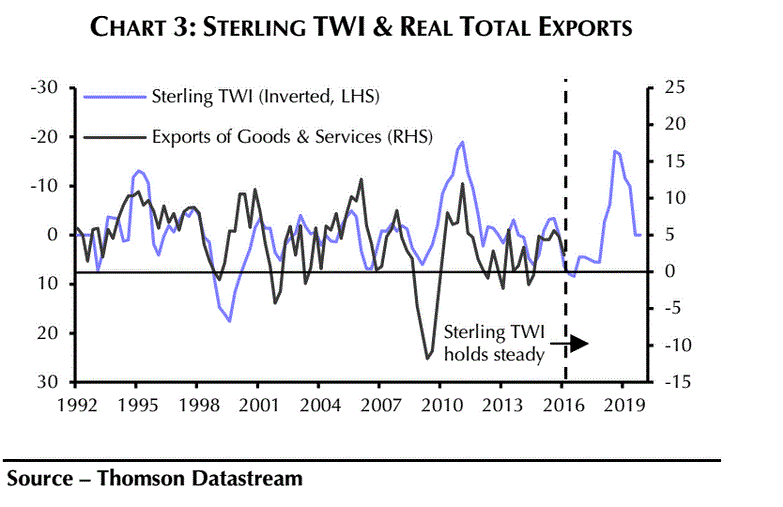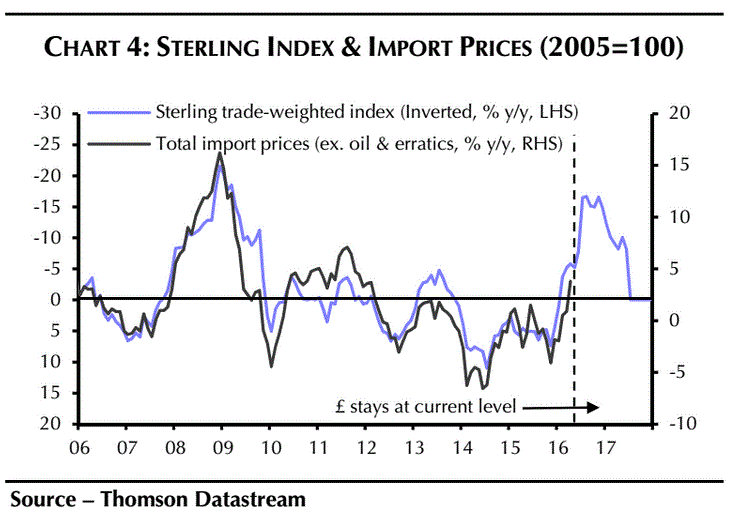Is The Pound’s Post-Brexit Fall Actually 'Just right' for the Economy?
The positive stimulus to exports of a weaker pound, combined with a less marked rise in inflation could be the perfect 'bircher' for the economy's post Brexit hang-over, argues economist Jonathan Loynes

The pound has fallen over 11% against a basket of currencies since Brexit and although this has been largely characterized as something negative, economist Jonathan Loynes sees sterling’s depreciation as ‘just about right’ from an economic perspective - a 'goldilocks depretiation'.
Loynes argues that the pound’s previous rate, before Brexit, was disadvantageously high, and contributed to the country’s relatively large trade deficit, by making UK exports uncompetitively expensive.
“The pound’s depreciation could again give UK exports a substantial boost a bit further ahead.” He says in a recent report.
His comments echo Woolfsen prize-winning economist Roger Bootle, who said, before the referendum, that if there was a Brexit and the pound depreciated steeply, it could have positive longer-term side effects.
This is because it could help to rebalance trade and close the trade deficit by increasing the attractiveness of UK exports, and reducing the demand for ‘imports’.
Comparison with depreciation in 2007
The boost to trade from a weaker pound could be even more emphatic compared to the other recent comparable period of depreciation following the financial crisis in 2007.
At that time the weaker pound also gave exports a fillip, but the effect was dampened by the general slowdown in the global economy, a factor which is absent this time round:
“Note too that, with the global economy stronger than after the pound’s previous sharp falls, the boost to exports could arrive more quickly this time.” Says Loynes.
Whilst it is hoped a weaker pound will increase exports, an expected downside will be the consequent rise in inflation.
This would come from a rise in the price of imports. The price of petrol at the pumps will rise, the cost of foreign imports, including clothes, food, wine, cars and electrical goods will also increase.
Overall this will drive up inflation, which will eat into the people’s disposable income, essentially making them ‘poorer’ as compared to when prices were lower pre-Brexit.
Loynes, however, argues the high inflationary effect is unlikely to last for long and the negative impact will be less than it was in 2009:
“The direct inflationary impact of the pound’s fall was relatively short-lived. As Chart 4 shows, import price inflation rose to over 15% in early 2009 but was back down to zero by the end of that year.”
The inflationary impact in 2009 was exacerbated by the coincidental sharp rise in commodity prices, which saw crude oil rise from $35 per barrel to $125 per barrel. This prolonged the inflationary effect for longer, argues Loynes.
Given there is not the same rally in commodities occurring at the moment, it seems unlikely that the inflationary impact will be as marked, or as negative in its erosion of real income.
The lower rate of unemployment now compared to 2009 means there is also a good chance workers can protect their ‘real incomes’ via wage increases, which are easier to negotiate during periods when there is a shorter supply of unemployed workers.
“While the pound’s fall will push import prices higher (see Chart 4 again), we don’t expect the impact on inflation to be as big and as prolonged as it was post the 2008 depreciation. (See last week’s Weekly article “How far will inflation rise?”.) Meanwhile, with unemployment considerably lower than it was after 2008, there would appear to be a better chance that workers can protect their real incomes via pay increases.”
Loynes does point out however, that he might be “rather more concerned if the pound were to drop a lot further”.
He also suggests further falls are possible given the expected wider divergence in monetary policy between the Fed which looks likely to increase interest rates and the Bank of Engalnd which looks likely to reduce them.
Nevertheless, he suggests that as long as further declines are ‘gradual’ the depreciation should continue create a ‘goldilocks’ effect on the economy.
Possibility of credit rating downgrade casts a shadow
Whilst the economic benefits of a weaker pound are portrayed by Loynes as presenting a ‘Goldilocks’ effect for trade balance and inflation, there are concerns that the pound may depreciate even lower and potentially in quite a radical disorderly way.
Credit rating agency Standard and Poor (S&P), for example, have suggested the pound could fall a further 7-14% in coming months if certain Brexit ‘spawned’ risks come to fruition.
These include the possibility of a second referendum on Scottish Independence, as a result of the majority of Scots voting to remain in the EU. The first referendum in 2014 caused a fairly substantial devaluation of the pound in the run up then.
The second major concern is that Sterling will lose its status as a reserve currency. Currently it has a 4.8% share of global reserves, but if it were to fall below 3.0% S&P believe it would lose its status.
A final concern is a potential widening in the current account deficit, which already reached record levels in May.
This was due to the rapid fall in foreign investment which had previously balanced the UK’s traditionally wide trade deficit, due to it importing far more than it exports.
To a certain extent the third risk may not materialise due to the goldilocks effect on exports from the deprecation of the pound.
If there is the expected increase in exports, it could cancel out the fall in foreign investment, which could result in little overall change for the current account.
In addition, the cheaper pound may attract foreign investment due to some UK assets being viewed as providing ‘good value’.
Nevertheless, this does not eradicate the threat of a Scots referendum or sterling losing its reserve status, both of which could lead to a further rating downgrade, which would consequently set off further sharp declines in sterling.






